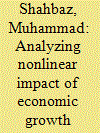|
|
|
Sort Order |
|
|
|
Items / Page
|
|
|
|
|
|
|
| Srl | Item |
| 1 |
ID:
176111


|
|
|
|
|
| Summary/Abstract |
Several Asian countries are facing challenges regarding the accomplishment of the objectives of Sustainable Development Goals (SDGs), and India is facing a similar situation. Following this, this study talks about designing an SDG framework for India, which can be used as a benchmark for other Asian countries. In this pursuit, this study looks into whether per capita income, energy use, trade openness, and oil price have any impact on CO2 emissions between 1980 and 2019. The nonlinear autoregressive distributed lag approach proves that the fluctuations in independent variables have an asymmetric long-term impact on CO2 emissions. The results reveal that the prevailing economic growth pattern in India is environmentally unsustainable, because of its dependence on fossil fuel-based energy consumption and imported crude oil. Import substitution has been identified as one of the first stepping stones to address this issue, and accordingly, a multipronged SDG framework has been designed based on the direct and extended version of the study outcomes. While the Central policy framework shows a way to address SDG 7, SDG 8, SDG 12, and SDG 13, the Tangential policy framework shows the way to sustain the Central policy framework by addressing SDG 4.
|
|
|
|
|
|
|
|
|
|
|
|
|
|
|
|
| 2 |
ID:
162070


|
|
|
| 3 |
ID:
169135


|
|
|
|
|
| Summary/Abstract |
Rapid population growth in Pacific island cities far exceeds employment opportunities and is contributing to rising urban inequality and social exclusions. Livelihoods in the informal urban sector, such as market vending, provide much needed income, rural–urban connectivity and food security, but remain largely excluded from policy and planning frameworks. Spatial, economic and social exclusions limit vendors’ economic advancement, their influence over decision‐making, and their access to basic services. Local communities close to informal markets fill some of the gaps left by the policy neglect, but investment and strategic management remains inadequate when vendors do not have secure market places and recognised rights to work. This article reports on a study of three informal markets in Honiara, Solomon Islands. These markets lack legal status but make significant contributions to urban development and economic opportunities. Drawing on surveys and focus groups with vendors and urban decision‐makers we explore the impact of informal markets on urban economies, how social and institutional relationships hinder vendors’ economic advancement, and the opportunities to create more inclusive livelihoods that could contribute to equitable cities.
|
|
|
|
|
|
|
|
|
|
|
|
|
|
|
|
|
|
|
|
|